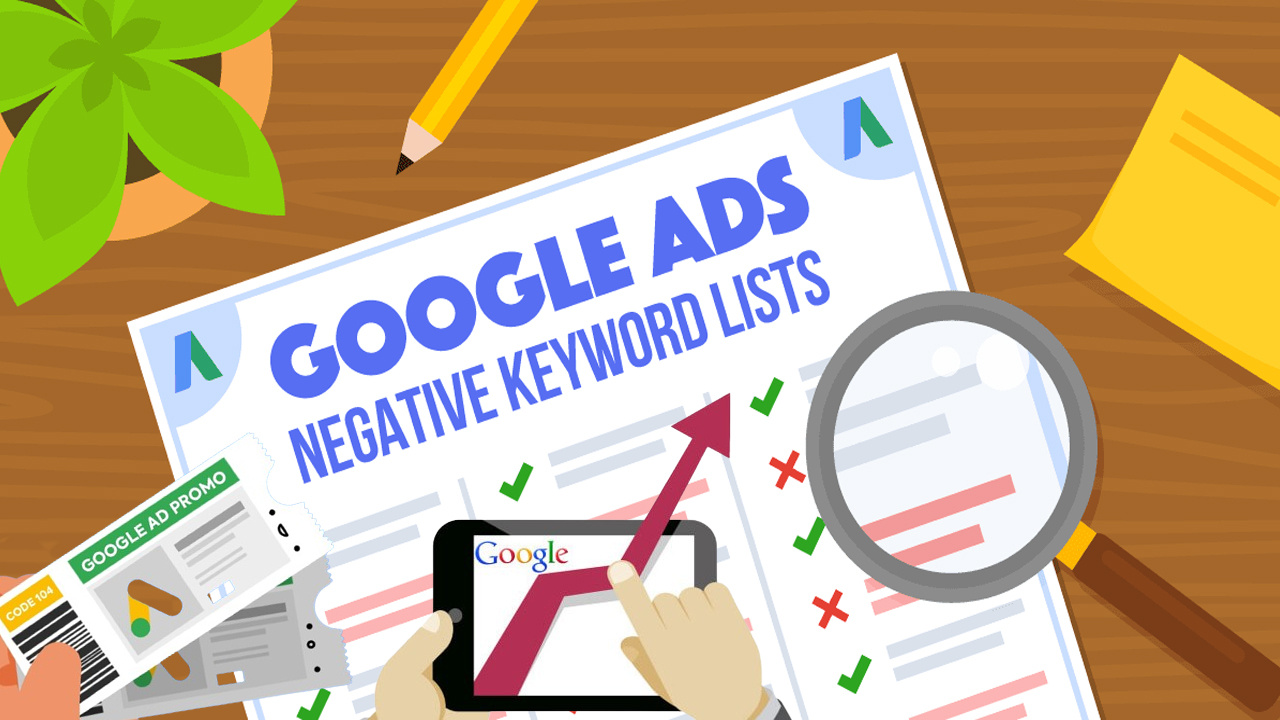Getting the right people to see your ads is like finding the perfect puzzle piece in the world of online ads. Imagine you’re selling soccer gear but your ads show up when someone is looking for cooking recipes. That’s not helpful! But do not worry there’s a cool tool called negative keywords in AdWords that helps you avoid showing your ads to the wrong crowd. In this guide, we will talk about how using negative keywords can be like having a superhero sidekick for your ads making sure they reach the right audience, and saving your budget from going on adventures where it does not need to be! So let’s dive into the world of negative keywords and learn how to make your online ads super effective
Table of Contents
Understanding Negative Keywords
Negative keywords are like filters for your online ads. Picture them as words or phrases you do not want your ad to be associated with. Let’s say you’re selling stylish shoes but you do not want your ad to appear when someone is searching for free shoes or shoe repair. These unwanted words become your negative keywords.
By using negative keywords you help your ad show up in front of the right people those who are interested in buying your stylish shoes. It’s like telling the online system Hey do not show my ad when people are searching for things that are not related to what I’m selling. This way you save money and make sure your ad reaches the folks who are more likely to click and buy. So negative keywords are like the bouncers for your ad party letting in only the guests who want to dance!
Conducting keyword research is like being a detective for your online business. Imagine you’re searching for clues to understand what words people type into search engines when they’re looking for things related to what you sell. Let’s say you’re into selling cozy blankets. Your mission is to find out if people are typing things like warm blankets soft throws or maybe even comfy cover-ups.
To do this detective work you can use special tools to see which words are popular and which ones are not. It’s like peeking into a secret code that people use to find stuff online. Once you know these secret words you can use them in your online ads. It’s like speaking the same language as your customers so when they’re looking for cozy blankets your ad pops up and says Hey I’ve got just what you need! Conducting keyword research helps you understand the magic words that connect your business with the people who want what you have to offer.
Building a Comprehensive Negative Keyword List

Building a comprehensive negative keyword list is like making a list of words you do not want your online ads to be friends with. Imagine you have a shop that sells yummy ice cream but you do not want your ad to show up when someone is looking for ice cream recipes or free ice cream coupons. These words are not the kind of friends you want for your ads!
So you make a list of these not-so-friendly words. It’s like telling the computer Hey do not invite my ad to the party if these words are on the guest list. This list helps your ads hang out with the right crowd the people who are interested in buying your delicious ice cream. It’s like creating a VIP list for your ads so they only go where they’re wanted and not where they might get confused. Building a comprehensive negative keyword list is your way of being the bouncer for your ad party making sure only the right guests get in!
Utilizing Match Types
Using match types for keywords is a bit like giving your online ads a set of rules to follow. Imagine you have words that describe your cozy blankets like soft throws. Match types help you decide how strict or flexible you want these rules to be.
It’s like saying Okay ads you can hang out with words that are kind of like soft throws. It’s cool if there are a few extra words in the mix. So if someone types comfy blankets or snuggly throws your ad might still show up.
Now it’s a bit more specific. You’re telling your ads to Only join the party if the words soft throws are together in that order. So if someone searches for super soft throws your ad is in but not if they type soft throws.
This is like being super picky. You’re saying Ad you’re invited only if someone types exactly soft throws and nothing else. It’s the most precise rule for your keywords.
Choosing the right match type is like deciding how strict you want your ads to be about the words they’re friends with. So whether you’re open to a big group or looking for an exclusive gathering match types help your ads follow the right party etiquette online!
Regularly Reviewing and Updating Your List

Regularly checking and updating your list is like giving your online ad party a fresh makeover. Imagine you made a list of words your ad does not want to hang out with but things change new words become popular and some lose their sparkle.
So now and then it’s a good idea to take a peek at your list. It’s like opening your closet and checking if your favorite clothes still fit or if there are new styles in town. For your negative keyword list, you want to make sure it’s up-to-date and includes all the words that could be party crashers for your ads.
If you notice a word that’s not cool anymore or find a new one causing trouble just update your list. It’s like keeping your guest list current so that your ad party stays trendy and attracts the right crowd. Regularly reviewing and updating your list is your way of ensuring your ads are always ready for the coolest online gatherings!
- Regularly reviewing your negative keyword list helps you stay in tune with changing online trends and ensures your ad campaign remains relevant.
- The digital landscape is dynamic and new keywords may emerge. Periodic reviews allow you to identify and incorporate these keywords into your exclusion list.
- Just as fashion styles evolve the popularity of search terms can change. Regular updates help eliminate outdated or ineffective negative keywords from your list.
- Keeping your negative keyword list up-to-date is essential for maintaining the relevance of your ad campaign. It ensures that your ads are shown to the right audience and minimizes wasted clicks.
- User behavior in online searches can shift over time. By reviewing and updating your list you can adapt to these changes and align your campaign with current search patterns.
- A well-maintained negative keyword list improves the efficiency of your advertising budget by preventing your ads from appearing in irrelevant searches ultimately saving you money.
- Regular updates enable you to fine-tune your targeting ensuring that your ads reach the most interested and valuable audience for your products or services.
- Analyze campaign performance data to identify which negative keywords are most effective in filtering out irrelevant traffic. This data-driven approach helps you make informed decisions during the review and update process.
Monitoring and Analyzing Campaign Performance
Monitoring and analyzing your ad campaign performance is akin to having a watchful eye over the success of your online endeavors. Imagine a dashboard that gives you a real-time overview of how well your ads are doing acting as a control center for your digital strategy. Regularly checking this dashboard becomes a pivotal routine allowing you to gauge the effectiveness of your campaign by observing key metrics such as clicks conversions and costs. These metrics serve as a roadmap guiding you through the digital landscape and helping you understand if your campaign is heading in the right direction.
Campaign performance data functions as a valuable teacher offering insights into user behavior and campaign effectiveness. If certain aspects are performing exceptionally well that’s fantastic! If not it’s an opportunity to learn and adapt. Like adjusting the sails of a ship to catch the best wind analyzing campaign data enables you to optimize your strategy for success. This continuous journey of monitoring and learning ensures that your campaign remains flexible and responsive and evolves to meet the dynamic challenges of the digital advertising seas.
Final words
In this guide on how to effectively use negative keywords in your AdWords campaigns think of negative keywords as the superhero sidekick for your online ads. By creating a list of words you do not want your ads to be friends with you’re like a guardian ensuring they only hang out with the right crowd. Regularly updating this list is like giving your ads a fresh coat of paint making sure they stay trendy in the ever-changing online world.
Remember negative keywords help your ads reach the people who want what you’re offering saving your budget and boosting the effectiveness of your campaign. So whether it’s keeping the wrong words away or adjusting your list to stay in tune with the latest trends using negative keywords is your secret weapon for a successful AdWords adventure. Happy advertising!
FAQs
How do I choose the right negative keywords for my campaign?
To choose the right negative keywords, conduct thorough keyword research. Identify terms that may trigger your ads but are not aligned with your goals. Consider generic terms, irrelevant locations, and phrases related to freebies or DIY solutions.
Why should I bother with negative keywords in my AdWords campaigns?
Negative keywords act as filters for your ads, ensuring they appear in front of the right audience. By excluding irrelevant searches, you save money and improve the overall effectiveness of your campaign.
Is it necessary to regularly update my negative keyword list?
Yes, regular updates are crucial. The online landscape evolves, and user behaviors change. Periodically reviewing and updating your negative keyword list ensures that your ads remain relevant and effective over time.
What match types should I use for negative keywords?
Experiment with different match types, including broad, phrase, and exact, to find what works best for your campaign. Broad match provides flexibility, while phrase and exact matches offer more precision in excluding specific terms.
Can negative keywords improve the cost efficiency of my AdWords campaign?
Absolutely By excluding irrelevant searches, negative keywords help you avoid unnecessary clicks that are unlikely to convert. This optimization leads to better cost efficiency, as your budget is directed toward reaching a more targeted and interested audience.

Dilshad Mushtaq is the founder and CEO of Best SEO Zone which is a prominent digital marketing agency based in Pakistan Since 2010. He is a professional website developer & Digital Marketer who can create any website and rank it on Google Page One.




